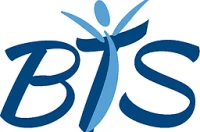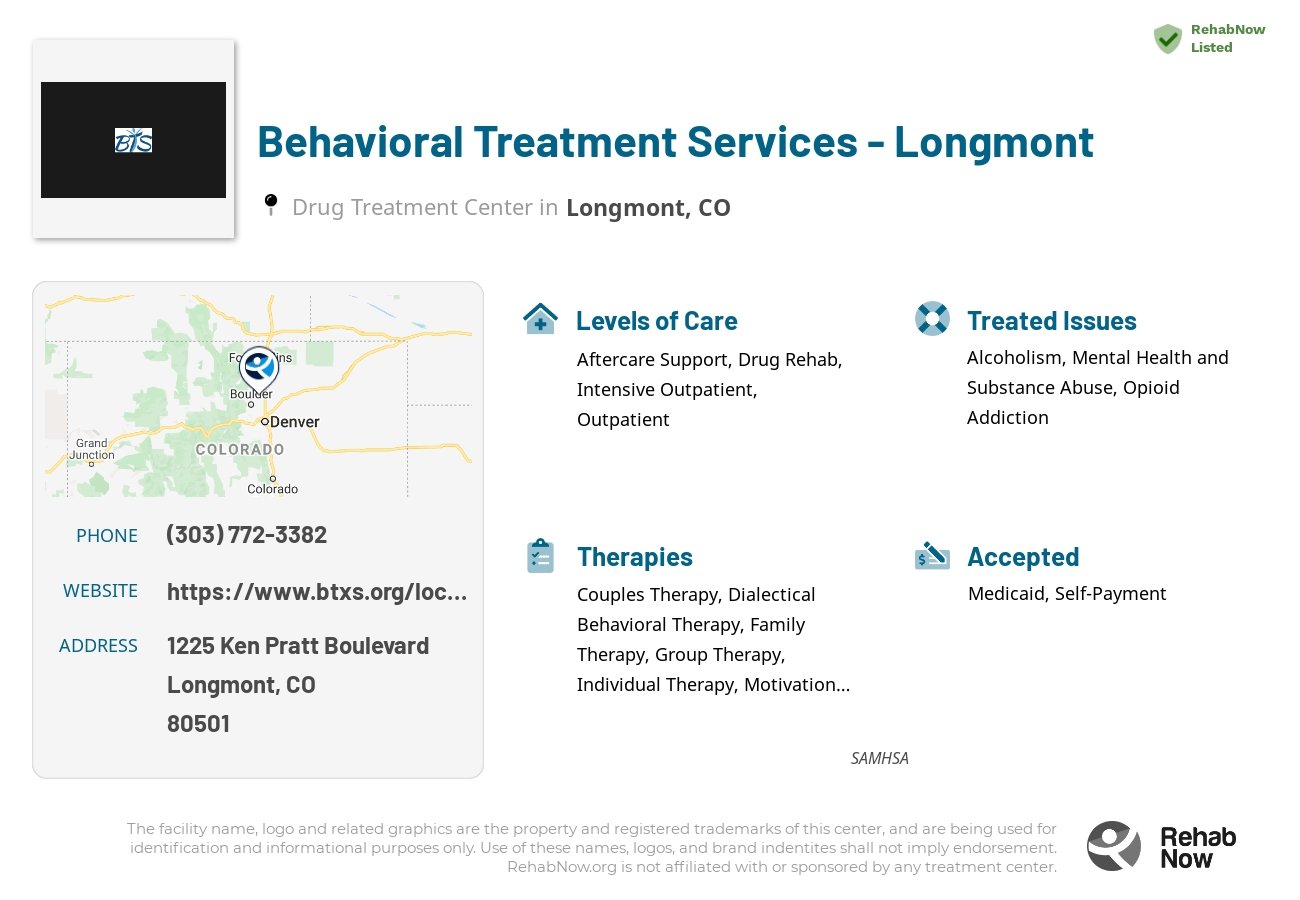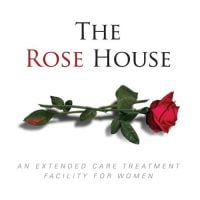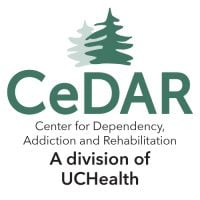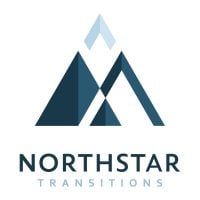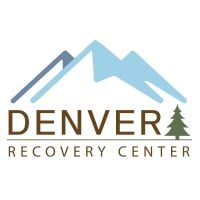Behavioral Treatment Services - Longmont
Drug Rehab Center in Longmont, Colorado
Behavioral Treatment Services - Longmont in Longmont, Colorado is a behavioral health facility that offers a variety of treatments for addiction and substance abuse, including counseling, therapy sessions, and relapse prevention, all provided by licensed professionals and accredited by relevant authorities.
About Behavioral Treatment Services - Longmont in Colorado
Behavioral Treatment Services - Longmont is an addiction treatment facility located in Longmont, Colorado. Established in 2014, this facility is dedicated to providing support and treatment for individuals suffering from alcoholism, dual diagnosis, opioid addiction, drug addiction, substance abuse, and mental health issues. Behavioral Treatment Services - Longmont is accredited by the Substance Abuse and Mental Health Services Administration (SAMHSA) and holds a state license, ensuring that they meet the highest standards of care and professionalism. With their commitment to helping individuals overcome addiction, this facility offers aftercare support, drug rehab, intensive outpatient, and outpatient levels of care.
Behavioral Treatment Services - Longmont offers a range of services for individuals struggling with addiction and substance abuse. Their programs are designed to address various needs and levels of care, providing personalized treatment plans tailored to each individual's unique situation. With a focus on comprehensive care, this facility offers aftercare support to ensure a smooth transition back into daily life after treatment. Additionally, they provide drug rehab services, assisting individuals in detoxification and recovery from substance abuse. Intensive outpatient programs are also available, offering structured support and therapy while allowing individuals to maintain their daily routines. The facility further offers outpatient services to provide ongoing support and treatment at a less intensive level.
Genders
Ages
Modality
Additional
Accreditations
State License
SAMHSA
Conditions and Issues Treated
Many people who struggle with opioid addiction need to attend specific programs like methadone , Suboxone or Vivitrol clinics.
These types of programs will provide the patient with legal, prescription medications that can help them overcome their cravings for illegal opioids like heroin or fentanyl . If the patient has a chronic condition like Hepatitis C, they must undergo treatment before they can begin taking these medications.
Levels of Care Offered
This center offers a variety of custom treatment tailored to individual recovery. Currently available are Aftercare Support, Drug Rehab, Intensive Outpatient, Outpatient, with additional therapies available as listed below.
An intensive outpatient program is usually the first phase of addiction treatment. It provides relief for those who are addicted, but are not ready to commit to an inpatient setting. Typically, the patient lives at home and is able to work or go to school. IOPs consist of a daily 3 to 5-hour program, and there is a required number of hours per week. Most patients go to IOP between 20 and 40 hours per week. The patient attends group counseling and individual therapy throughout the duration of treatment. They also meet daily with their therapist to discuss how it’s going and where they are in the recovery process.
The goal here is to teach patients healthy coping skills, such as stress management and identifying thoughts and behaviors that lead to relapse. The implementation of these skills will be useful as the individual transitions into the next phases of treatment.
An outpatient treatment program is set up to help with alcohol or drug addiction, or a co-occurring disorder. The patient must attend the Colorado facility for their therapy and other programs but are able to return home each night. The frequency of mandatory attendance decreases after much of Behavioral Treatment Services - Longmont‘s program is complete.
Aftercare is a term that’s used to refer to any sort of continuing care offered for a drug addict who has voluntarily entered a rehabilitation program. This type of care can be provided in several settings, including outpatient therapy sessions after the addict has completed an inpatient program. There are also 12-step support groups, such as Alcoholics Anonymous, which can provide additional help for addicts trying to stay sober.
Therapies & Programs
Individual Therapy is a critical component of addiction recovery. Therapists work with patients to identify the root of their addiction and figure out how to better handle the issues that led to them using drugs. Individual Therapy is the one-on-one session where people meet with their therapist. Individual therapy provides a safe space for people to open up and discuss personal and sensitive topics which they may not feel comfortable discussing in a group setting.
Couples therapy at Behavioral Treatment Services - Longmont focuses on addiction treatment for the addict and their spouse. The addict’s family, not just the addict, can benefit from this form of therapy. Couples therapy addresses communication problems, trust issues, lack of intimacy, and abuse in intimate relationships. Couples therapy can help rebuild trust between partners, which increases the chances for successful treatment and sustained recovery.
Intimate relationships can be damaged during addiction, and professional help may be necessary to rebuild the often destroyed trust and love. Couples therapy at Behavioral Treatment Services - Longmont helps couples improve communication and rebuild trust. Either or both partners will be helped by this treatment administered by professionals. This treatment can also help one or both partners if addiction is the problem.
Family therapy will also help families realize that the addiction is not their fault. For many years, people blamed themselves for an addict’s behavior and felt that they had done something wrong. This is not the case. Addiction is a disease, and it can strike anyone, even if their life seems fine from the outside. It can bring a lot of shame to a family when they have an addict in their midst, but if everyone is open and honest with each other, then they can help everyone stay in recovery.
Group Therapy is utilized by drug treatment centers like Behavioral Treatment Services - Longmont to provide the recovering drug addict with a platform to talk about their feelings and experiences. It also provides for an opportunity to learn from other addicts who have successfully overcome their addiction.
Group Therapy is employed in lectures, seminars, or discussion groups (the latter two are typically conducted as “therapy groups”). It is recommended that all group members be recovering addicts for this type of therapy to work (though it does not exclude others with lived experience).
Trauma therapy is a clinical process that helps individuals deal with mental stress often caused by traumatic events. It is generally done for children, teenage victims of sexual assault, and war veterans. The therapist helps the person identify, understand and work through the problem. This is done with the help of talking about it in group or one-on-one counseling sessions. Therapists use relaxation, role-playing, art, and music to help the person open up about what is bothering them.
Dialectical Behavior Therapy (DBT) is used by drug treatment centers across the United States to help drug addicts become sober. DBT combines traditional behavioral treatments with elements from DBT, including dialectics, distress tolerance, and interlocking issues. It is commonly used to treat Borderline Personality Disorder (BPD) along with substance abuse disorders. The four DBT modules are mindfulness, interpersonal effectiveness, emotion regulation, and distress tolerance.
Cognitive behavioral therapy is also a popular service for individuals living with addiction. This type of supportive treatment uses both one-on-one counseling and group sessions to teach addicts how to identify thoughts, behaviors and emotions that might increase their risk of relapse.
These professionals can help addicts develop coping skills for managing stress, improving self-esteem and overcoming triggers. They might also use behavioral therapy to help addicts learn how to avoid cravings and warning signs that could lead them back into addiction.
Therapy can be used as a step-down from inpatient treatment or as the primary method of overcoming an addiction. No matter which option is best for the addict, they will teach important emotional coping techniques, which can make it easier for addicts to get through the tough days.
(REBT) was developed by Dr. Albert Ellis in 1955. The therapy is based on the premise that our beliefs lead to and maintain our emotions and behaviors. Therefore, if a person has irrational thoughts, they will have an unhealthy emotional life. And as long as those irrational beliefs remain unchanged, they will continue to have unhealthy emotions and behaviors.
REBT is a purely psychological therapy, meaning it does not incorporate the use of medications or supplements. Instead, REBT focuses on helping people understand, respect, and accept their feelings without judgment, enabling them to have more control over their actions and behaviors.
The therapeutic process is straightforward: clients learn to identify the irrational beliefs that cause distress, challenge good coping statements, and replace them with healthy, rational beliefs.
Payment Options Accepted
For specific insurance or payment methods please contact us.
Behavioral Treatment Services Associated Centers
Discover treatment facilities under the same provider.
- Center for Change - Lakewood in Lakewood, CO
- Center For Change in Boulder, CO
- Behavioral Treatment Services - Arapahoe Avenue in Boulder, CO
- Behavioral Treatment Services - Denver in Denver, CO
- Center For Change in Lakewood, CO
Learn More About Behavioral Treatment Services Centers
Additional Details
Specifics, location, and helpful extra information.
Longmont, Colorado 80501 Phone Number(303) 772-3382 Meta DetailsUpdated November 25, 2023
Staff Verified
Behavioral Treatment Services - Longmont Patient Reviews
There are no reviews yet. Be the first one to write one.
Longmont, Colorado Addiction Information
The Centennial State has slipped to a ranking of 12th in the country for drug abuse. Each year around 24% of the state's population uses illegal drugs while nearly 5% of its population abuses alcohol. Substance-related deaths in Colorado were responsible for 15.12% between 2008 and 2017. Fortunately, Colorado drug and alcohol addiction treatment are available to help a person overcome addiction.
The problem in Longmont, Colorado, is relatively bad. According to recent statistics, there are approximately 9,500 people who struggle with drug addiction in the city. This means that about 8% of the population is addicted to drugs. Almost 24% had used an illicit drug at some point. Many treatment centers offer specialized programs. It is important to find a treatment center that fits the individual's needs, as each person's situation is unique.
Treatment in Nearby Cities
- Dacono, CO (10.2 mi.)
- Granby, CO (44.1 mi.)
- Telluride, CO (211.0 mi.)
- Canon City, CO (117.9 mi.)
- Rangely, CO (195.4 mi.)
Centers near Behavioral Treatment Services - Longmont
The facility name, logo and brand are the property and registered trademarks of Behavioral Treatment Services - Longmont, and are being used for identification and informational purposes only. Use of these names, logos and brands shall not imply endorsement. RehabNow.org is not affiliated with or sponsored by Behavioral Treatment Services - Longmont.
